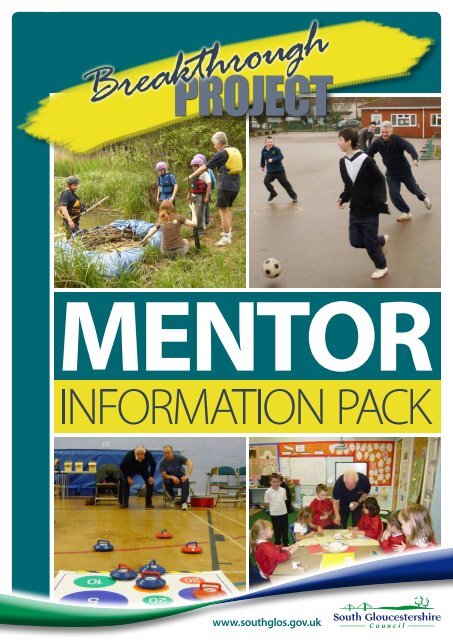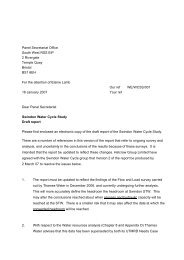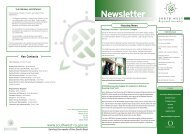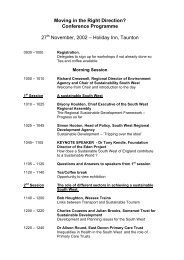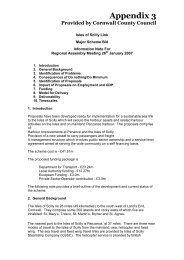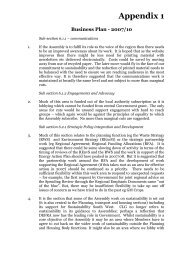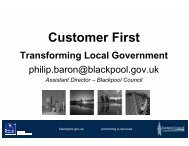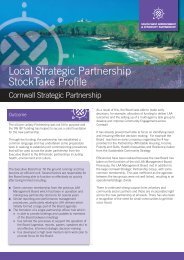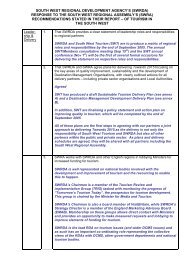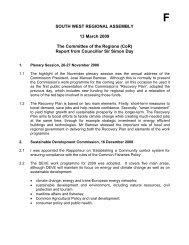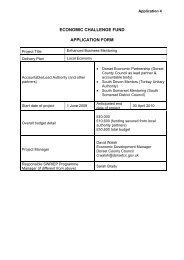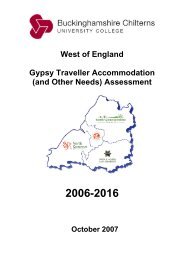Information pack
Information pack
Information pack
You also want an ePaper? Increase the reach of your titles
YUMPU automatically turns print PDFs into web optimized ePapers that Google loves.
www.southglos.gov.uk
What is Breakthrough?<br />
Breakthrough is an activity based mentoring<br />
scheme that uses skilled mentors to offer<br />
weekly, one-to-one support to a range of<br />
vulnerable people who have been identified<br />
by an agency as being in need of support. Our<br />
Mission Statement and values are shown below.<br />
The project uses activities to help our mentees to<br />
build positive relationships with adults and peers<br />
as well as interests and skills that can be sustained<br />
in the longer term. In some placements, short and<br />
long term targets are set and closely monitored for<br />
each placement and these are linked into reward<br />
events/activities.<br />
Mission Statement:<br />
Breakthrough creates positive experiences and<br />
relationships to affect vulnerable people in order to<br />
help them achieve, grow, develop skills and realize<br />
their full potential.<br />
Values:<br />
1) Making a difference<br />
2) High quality mentoring<br />
3) Person centered outcomes<br />
4) Innovation<br />
5) Belief in Breakthrough<br />
6) Team work & team relationships
Rewards:<br />
How are placements set-up?<br />
1. Referral - a professional officer from a referring<br />
agency refers the person in question onto the<br />
project.<br />
2. Set-up meeting - a meeting is held with the<br />
Breakthrough Co-ordinator, the referring agency,<br />
supported person and if possible their parent/<br />
guardian/carer. At this meeting the needs and<br />
aims of all parties are discussed as well as targets<br />
and potential activities. Logistical issues such<br />
as transport and timings are also discussed. In<br />
particular, Breakthrough’s code of confidentiality is<br />
explained to all those at the meeting.<br />
3. Matching mentor to mentee - the<br />
Breakthrough Co-ordinator then identifies the most<br />
appropriate mentor to work with the person in<br />
question.<br />
4. The placement starts!<br />
Activities:<br />
Activities can be anything that is safe and within<br />
budget and can include sporting activities, arts and<br />
crafts, voluntary work or helping your mentee apply<br />
for a job. Breakthrough mentors are encouraged to<br />
involve their mentee in the choice of activity.<br />
In some placements, the Breakthrough coordinator,<br />
the referring professional and the mentee<br />
agree certain targets for the mentee to achieve. If<br />
the mentee achieves these targets then the mentor<br />
may arrange a reward event. It is important that<br />
this event should be different and exciting but also<br />
something that adds value in some way.<br />
Exit strategy:<br />
Before a placement finishes a meeting will take<br />
place between the co-ordinator and the mentor<br />
to discuss a suitable exit strategy for the mentee.<br />
A key part of Breakthrough is building long term<br />
friendships and interests for the mentee we are<br />
supporting. Getting the mentee to join some sort<br />
of community group to pursue an interest is always<br />
desirable, as is building positive friendship groups.<br />
Proving our outcomes:<br />
We use a variety of methods to prove our<br />
outcomes, including the Department of Health’s<br />
Strengths and Difficulties Questionnaire which<br />
evaluates the mentee’s emotional and behavioural<br />
development. Apart from this “hard” evidence, we<br />
also encourage our mentors to keep a record of<br />
“breakthroughs” big or small, such as learning to<br />
ride a bike, leaving the house alone, joining a gym<br />
and getting a place at college (“soft” outcomes).
Training and Support:<br />
The Breakthrough team always aims to<br />
provide as much support to our mentors as<br />
possible. This includes information sharing,<br />
an initial training programme followed by<br />
further training modules if/when necessary,<br />
availability for discussion and access to any<br />
resources required.<br />
We also operate a lone working policy that mentors<br />
should adhere to.<br />
Established mentors have constant support from<br />
the following:<br />
❚ Peer support group (with 3 planned team<br />
meetings per year)<br />
❚ Their Breakthrough Co-ordinator<br />
❚ The Breakthrough Training and Development<br />
Officer (a mentor for the mentors!)<br />
❚ Other members of the Breakthrough<br />
management team.<br />
❚ 24 hour emergency support<br />
Contacts:<br />
If an issue arises or you need to clarify anything and<br />
cannot get hold of your co-ordinator please call any<br />
of the below:<br />
Jonathan Wheeler<br />
(Co-ordinator)<br />
Mob: 07921492875<br />
Email: Jonathan.wheeler@southglos.gov.uk<br />
Jay Lee<br />
(Co-ordinator)<br />
Mob: 07795353825<br />
Email: Jay.lee@southglos.gov.uk<br />
Steve Spiers<br />
(Manager)<br />
Mob: 07711495867<br />
Email: Steve.spiers@southglos.gov.uk<br />
Annette Cook<br />
(Training and Development Officer)<br />
Mob: 07740961595<br />
Email: Annette.cook@southglos.gov.uk
Breakthrough will:<br />
❚ Have a well-communicated Mission Statement<br />
and values<br />
❚ Recruit, train and develop mentors<br />
❚ Have clear support structures for mentors<br />
❚ Have a child/person centred approach<br />
❚ Provide guidelines and boundaries for mentors<br />
and mentees<br />
❚ Match mentor to mentee (one-to-one)<br />
❚ Agree targets (if appropriate) with mentee<br />
❚ Agree an exit strategy with mentees (when<br />
necessary)<br />
❚ Have good relationships with other agencies<br />
❚ Demonstrate impact<br />
Breakthrough mentors will:<br />
High Quality Mentoring<br />
Breakthrough aims to deliver a high quality mentoring programme with a<br />
team of high quality mentors.<br />
❚ Put their mentee first, at all times<br />
❚ Give direction - guide and advise<br />
❚ Promote change<br />
❚ Be a positive role model<br />
❚ Be willing to listen<br />
❚ Give their mentee a chance to talk<br />
❚ Be willing to share the benefits of their<br />
experience<br />
❚ Provide positive reinforcement of their mentee as<br />
an individual<br />
❚ Give constructive feedback - direct but sensitive<br />
❚ Observe boundaries - verbal and non-verbal<br />
❚ Provide the mentee with appropriate tools/<br />
techniques to develop and grow<br />
❚ Provide a safe environment<br />
❚ Go the extra mile!<br />
Breakthrough mentors will be:<br />
❚ Reliable<br />
❚ A good communicator<br />
❚ Empathetic<br />
❚ Caring<br />
❚ Trust wor thy<br />
❚ Open and honest<br />
❚ Professional<br />
❚ Flexible<br />
❚ Innovative/Creative<br />
❚ Well organised – short term and long term<br />
❚ Patient<br />
❚ Approachable<br />
❚ Resilient
Breakthrough aims to deliver a high quality mentoring programme with a<br />
team of high quality mentors.<br />
Breakthrough mentors will know:<br />
❚ Breakthrough policies<br />
❚ Some background information on physical and<br />
emotional well being<br />
❚ Why they are working with this particular mentee<br />
❚ The history - including the referring body (eg<br />
school, CAMHS)<br />
❚ The overall objective<br />
❚ Agreed goals/targets (if appropriate)<br />
❚ The family situation<br />
❚ The mentee<br />
❚ personal profile<br />
❚ needs<br />
❚ strengths<br />
❚ weaknesses<br />
❚ trigger points<br />
❚ current personal situation<br />
And Finally<br />
❚ Their limits!<br />
IN SHORT, Breakthrough believes<br />
that high quality mentoring is<br />
about...<br />
❚ Being there<br />
❚ Being Open and Honest<br />
❚ Listening<br />
❚ Guiding and Advising<br />
❚ Caring<br />
❚ Being child/person centred
Code of Practice<br />
The purpose of this code of practice is to ensure that the relationship<br />
between the mentee and mentor is as positive and successful as possible and<br />
that each partner is clear about their roles.<br />
Mentors should understand that when mentoring, they represent the Breakthrough<br />
project and must therefore seek to act responsibly at all times.<br />
1 Mentors should not aim just to socialise with their mentee. It must be a relationship that adds value to the<br />
mentee’s life.<br />
2 Mentors should not assume that their mentee likes them, will listen to them or will be honest with them.<br />
3 Mentors should not make promises to their mentee that they cannot keep.<br />
4 Mentors should complete the appropriate forms and reports as asked for by the coordinator.<br />
5 Mentors should treat other people’s time with respect, by being punctual at all times.<br />
6 Mentors should not buy expensive gifts for, or give money to, their mentee. Any small gifts should be<br />
discussed first with the Breakthrough staff.<br />
7 Mentors should not accept money from their mentee. Any other gifts or presents received by a mentor<br />
must be discussed with the Breakthrough staff.<br />
8 Mentors must not be under the influence of alcohol or any illegal substance whilst with their mentee.<br />
9 Mentors should not encourage or allow a young person to use alcohol or any illegal substance.<br />
10 If a mentee turns up to a session under the influence of alcohol or any illegal substance then the mentor<br />
should inform the mentee that the session will not take place and explain why. They should then ensure<br />
that their mentee is left in a safe place and inform the coordinator as soon as possible.<br />
11 Mentors should never invite a mentee to their home, without prior agreement with Breakthrough staff.<br />
12 Mentors must never enter into a physical/intimate relationship with any mentee they work with.
Confidentiality &<br />
Managing <strong>Information</strong><br />
Code of Confidentiality<br />
Within the mentoring relationship, it is important that the mentee knows that many<br />
things they tell are, and will remain, confidential. However, they also have to be aware<br />
that should they disclose anything which is illegal, or has the potential to cause harm<br />
to themselves or others, the mentor has a duty to pass it on to an appropriate person.<br />
❚ At the start of the placement (usually as part of the set-up meeting) the Breakthrough co-ordinator will<br />
explain the code of confidentiality to the mentee.<br />
❚ If there is a need to breach confidentiality (as explained above), Breakthrough or a relevant agency will<br />
then explain to the mentee, prior to it happening, why this information needs to be shared and who will<br />
be told. Where this is not possible (in an emergency) the mentee will be told of the breach at the earliest<br />
opportunity.<br />
❚ Any information passed to a mentor may be shared with the Breakthrough co-ordinator if the mentor<br />
deems necessary. However, this information will not be shared with a third party outside the project<br />
without permission from the source unless there is a risk of significant harm to an individual.<br />
❚ Each mentee will be made aware that information is compiled on them and then shared with a mentor.<br />
Mentees have the right to see any written information about them, in the presence of their mentor or the<br />
co-ordinator.<br />
❚ Mentors should not discuss personal details about any mentee with anyone outside the Breakthrough<br />
project.<br />
❚ Mentors should be clear about what information they wish to share with a mentee and should not be<br />
pressured to move from this.<br />
❚ Where mentors record information, they should not record the mentee’s full name. First names or initials<br />
would be appropriate.
Health & Safety Guidelines<br />
Physical contact:<br />
Personal Safety:<br />
❚ Follow the Breakthrough Lone Working policy at<br />
all times.<br />
❚ Ensure you have a fully charged mobile with you<br />
during your sessions.<br />
❚ Do not give the young person your home<br />
telephone number and use the prefix 141 when<br />
calling from home.<br />
❚ When choosing a venue for your meeting,<br />
wherever possible choose a public place where<br />
other adults are on hand.<br />
❚ When transporting your mentee in your car:<br />
❚ You must be insured for business use. Please<br />
check with your insurance company<br />
❚ Your car must be roadworthy<br />
❚ All mentees must wear a seat belt<br />
❚ Do not accept/put up with any kind of violence/<br />
harassment from your mentee. If such incidents<br />
occur or you feel they are likely to occur, please<br />
contact your co-ordinator who will support you<br />
in dealing with this.<br />
❚ Any accidents or incidents should be recorded<br />
immediately on an incident form and sent to<br />
your co-ordinator.<br />
Guidelines around physical contact are<br />
very important because of the danger of<br />
misinterpretation and unwelcome contact<br />
to the young person. Physical punishment is<br />
obviously outlawed as is sexual contact. This<br />
includes sexual remarks and innuendo. It is<br />
also not advisable to use bad language.<br />
When considering the issues of physical contact<br />
bear in mind these points:<br />
❚ Is the contact appropriate for the age of the<br />
young person?<br />
❚ Is it consistent with what a good parent/carer<br />
would do?<br />
❚ How will the young person perceive the contact?<br />
❚ Are the young person’s needs and wishes being<br />
considered first and foremost in the contact?<br />
(Taken from Good Care Matters: Department of Health, Crown Copyright 1996)<br />
Please Note:<br />
If you are in any doubt about whether a session<br />
is suitable for your mentee, then it probably<br />
isn’t! Here are some sessions to be wary of:<br />
1) Anything using toxic substances<br />
2) Anything using knives<br />
3) Anything using boiling water<br />
4) Anything in extreme weather conditions<br />
5) Anything you don’t feel qualified to oversee<br />
6) Anything in a venue you don’t feel confident in<br />
7) Anything that brings you into direct contact with<br />
electricity<br />
8) Any session when you are unsure about the state<br />
of the mentee’s mind<br />
If you are in doubt don’t do it, even if you have<br />
arrived at the venue and your mentee is excited. If<br />
you want a second opinion, ask your co-ordinator.
Lone Working Policy<br />
1. Each mentor will supply Breakthrough with the<br />
name and contact number of a designated<br />
buddy, and will supply their buddy with the<br />
Breakthrough team’s contact numbers, particularly<br />
identifying their Breakthrough Co-ordinator.<br />
The mentor will inform their buddy of the details of<br />
their session, ie mentee’s name, start and end time<br />
of session, location.<br />
2. The Breakthrough team will have access to each<br />
mentor’s contact details, their buddy’s contact<br />
details and their mentees’ contact details.<br />
3. For each session:<br />
On completion of the session, the mentor will<br />
contact their buddy and inform them that they<br />
have finished the session.<br />
IF the buddy does not hear from the mentor at the designated time the following procedure should<br />
be followed:<br />
Buddy to contact the mentor Everything is OK NO FURTHER ACTION REQUIRED<br />
No reply<br />
Contact Breakthrough Co-ordinator (or a member of the Breakthrough team)<br />
The Breakthrough Co-ordinator will try to<br />
contact the mentor<br />
Everything is OK<br />
NO FURTHER ACTION REQUIRED<br />
No reply<br />
Contact the mentee (or their family)<br />
The Breakthrough Co-ordinator will try to<br />
contact the mentee<br />
Everything is OK<br />
NO FURTHER ACTION REQUIRED<br />
Still concerns over the mentor’s safety or wellbeing<br />
Breakthrough will contact the appropriate authorities<br />
and inform the buddy of what is happening


